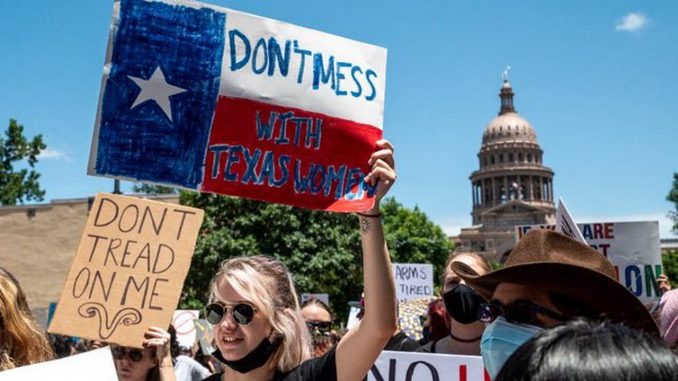
The Justice Department says it plans to ask the Supreme Court to block Texas’s controversial new abortion law hours after a federal appeals court ruled that the statute can remain in effect while it hears the Biden administration’s legal challenge.
“The Justice Department intends to ask the Supreme Court to vacate the Fifth Circuit’s stay of the preliminary injunction against Texas Senate Bill 8,” Anthony Coley, a spokesman for the department, said in an emailed statement Friday.
A three-judge panel for the Fifth Circuit Court of Appeals ruled 2-1 late Thursday night in favor of keeping the law known as S.B. 8 in effect, overruling a trial judge’s injunction that blocked the ban on abortions after six weeks of pregnancy.
The move will once again present the Supreme Court with the question of whether to suspend S.B. 8, which has shut down many of the state’s abortion providers over fears of legal liability.
The high court will hear in December another case over a Mississippi abortion restriction that is directly challenging the landmark 1973 decision in Roe v. Wade, which established a constitutional right to abortions.
The Texas law has been in place since Sept. 1, when the Supreme Court declined to stop it from going into effect in a 5-4 ruling. Five of the high court’s conservative justices voted in favor of the law while Chief Justice John Roberts and the three members of the bench’s liberal wing dissented.
It’s unclear whether the administration’s challenge will play out the same way as the case from last month, which involved a challenge from abortion providers in Texas.
The law is controversial both for its severe restriction on abortions, banning procedures before most women even realize that they are pregnant, and for its novel approach to enforcing the limits, giving private citizens the ability file civil lawsuits that could award them $10,000.
Critics have blasted the system as awarding “bounties” that incentivize private citizens to undermine a constitutional right. The private enforcement regime has also created procedural obstacles for the legal challenges against the law.
Because the state’s public officials are not in charge of enforcing the ban, courts must question whether they can be the subject of lawsuits targeting the law. Texas is also arguing that the federal government lacks standing and a cause of action to bring its case.
How the Supreme Court views those procedural issues will likely be major factors in how it rules on whether the law can remain in effect.
The DOJ argues that the private enforcement regime is a transparent attempt to shield what they see as a blatantly unconstitutional ban and that if the scheme were allowed to stand, could allow states to undermine other constitutional rights in similar ways.
“Texas does not even attempt to defend SB8’s constitutionality in this Court,” department lawyers wrote in a filing to the Fifth Circuit this week. “Recognizing that SB8 contravenes controlling Supreme Court precedent, Texas instead crafted the law to hinder judicial review, by disclaiming enforcement powers and by attempting to render any post-enforcement review ineffective.”
Via The Hill
